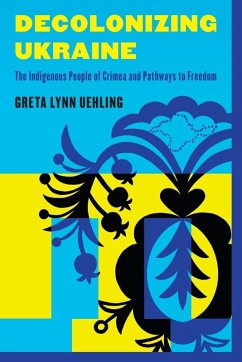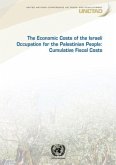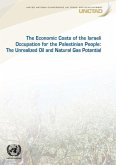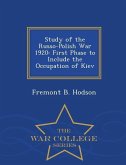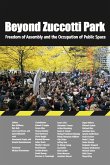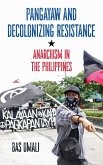- Broschiertes Buch
- Merkliste
- Auf die Merkliste
- Bewerten Bewerten
- Teilen
- Produkt teilen
- Produkterinnerung
- Produkterinnerung
A groundbreaking and essential read - illuminates the untold stories of Russia's occupation of Crimea from 2014 to the present
Andere Kunden interessierten sich auch für
![The Economic Costs of the Israeli Occupation for the Palestinian People The Economic Costs of the Israeli Occupation for the Palestinian People]() The Economic Costs of the Israeli Occupation for the Palestinian People25,99 €
The Economic Costs of the Israeli Occupation for the Palestinian People25,99 €![The Economic Cost of the Israeli Occupation for the Palestinian People The Economic Cost of the Israeli Occupation for the Palestinian People]() The Economic Cost of the Israeli Occupation for the Palestinian People25,99 €
The Economic Cost of the Israeli Occupation for the Palestinian People25,99 €![Study of the Russo-Polish War 1920: First Phase to Include the Occupation of Kiev - War College Series Study of the Russo-Polish War 1920: First Phase to Include the Occupation of Kiev - War College Series]() Fremont B. HodsonStudy of the Russo-Polish War 1920: First Phase to Include the Occupation of Kiev - War College Series18,99 €
Fremont B. HodsonStudy of the Russo-Polish War 1920: First Phase to Include the Occupation of Kiev - War College Series18,99 €![Beyond Zuccotti Park: Freedom of Assembly and the Occupation of Public Space Beyond Zuccotti Park: Freedom of Assembly and the Occupation of Public Space]() Beyond Zuccotti Park: Freedom of Assembly and the Occupation of Public Space25,99 €
Beyond Zuccotti Park: Freedom of Assembly and the Occupation of Public Space25,99 €![Pangayaw and Decolonizing Resistance Pangayaw and Decolonizing Resistance]() Bas UmaliPangayaw and Decolonizing Resistance14,99 €
Bas UmaliPangayaw and Decolonizing Resistance14,99 €![The Obamacare Hypocrites: 341 reasons why Democrats and unions that support Obamacare want exemptions for themselves The Obamacare Hypocrites: 341 reasons why Democrats and unions that support Obamacare want exemptions for themselves]() Daniel AlmanThe Obamacare Hypocrites: 341 reasons why Democrats and unions that support Obamacare want exemptions for themselves12,99 €
Daniel AlmanThe Obamacare Hypocrites: 341 reasons why Democrats and unions that support Obamacare want exemptions for themselves12,99 €![Our Enemies Will Vanish Our Enemies Will Vanish]() Yaroslav TrofimovOur Enemies Will Vanish10,99 €
Yaroslav TrofimovOur Enemies Will Vanish10,99 €-
-
-
A groundbreaking and essential read - illuminates the untold stories of Russia's occupation of Crimea from 2014 to the present
Hinweis: Dieser Artikel kann nur an eine deutsche Lieferadresse ausgeliefert werden.
Hinweis: Dieser Artikel kann nur an eine deutsche Lieferadresse ausgeliefert werden.
Produktdetails
- Produktdetails
- Verlag: Rowman & Littlefield Publishers
- Seitenzahl: 224
- Erscheinungstermin: 3. Februar 2025
- Englisch
- ISBN-13: 9798881804466
- Artikelnr.: 71887590
- Herstellerkennzeichnung
- Produktsicherheitsverantwortliche/r
- Europaallee 1
- 36244 Bad Hersfeld
- gpsr@libri.de
- Verlag: Rowman & Littlefield Publishers
- Seitenzahl: 224
- Erscheinungstermin: 3. Februar 2025
- Englisch
- ISBN-13: 9798881804466
- Artikelnr.: 71887590
- Herstellerkennzeichnung
- Produktsicherheitsverantwortliche/r
- Europaallee 1
- 36244 Bad Hersfeld
- gpsr@libri.de
By Greta Lynn Uehling
Contents
List of Illustrations
List of Abbreviations
Note on Translation and Transliteration
Preface
Introduction
The Alchemy of Adversity
A Settler Colonial Project
The Book's Organizational Logic
Recognition
Cognitive Deoccupation
Chapter Overview
I. Part One: Historical Grounding
1. Crimea
Crimea in a Word
The Logic of Russia's Occupation
Discrediting, displacing, and dispossessing Crimean Tatars
Crimea is Ukraine
Rethinking Regional History
The Hybrid Operation to Capture Crimea
The Unlawful Referendum
Passportization
Summary
2. Why Indigeneity Matters for Ukraine
The Basis of Indigenous Status in International Law
Indigenous Rights are Human Rights
Indigenous Rights are More Capacious than Minority Rights
The Case Against Indigenous Status
Indigenous Governance
When Elephants Fight: Indigeneity in Russia
The Other Elephant: Indigeneity in Ukraine
What Crimean Tatars Mean for Ukraine
Summary
II. Part Two: Unraveling
3. Displaced in Time and Space by the 2014 Occupation of Crimea
Displacement in Time and Space
A Return to the USSR
Dreams and Nightmares
"Like an Excursion to an Asylum"
"Like in a science fiction film"
Inverting Moral Hierarchies
Summary
4. Unraveling: Talk of Treason Divides Crimean Society
Everyday War
Accusations of Treason in Crimea: A Brief History
Political and Personal
Romantic Partner Relationships
Voting in the Referendum
Parents and Children
Friendship
Portraits of Stalin
Treason at Scale
Summary
III. Part Three: Coalescing
5. Making Crimean Tatars More Grievable: Mourning and Recognition through
the 2016 Eurovision Contest
Meeting Jamala
The Politics of Pity and Recognition
The Song "1944:" What it Mourns
"Where's Your Heart?"
An Apolitical Project
More Grievable Meant More Livable
The Contrast between Grief and Pity: Grief Builds Community
Raising Awareness
Now We Cannot Be Forgotten
The Album "Qirim"
Summary
6. Claiming Freedom
Oppression during the Soviet Period
Claiming Themselves
"I decided to change my life"
"You can say anything you want"
Civic Identity: "Head and Heart"
The National Context
The Cultivation of Freedom
New Narratives
Gradations of Freedom
Summary
IV. Part Four: Reclaiming
7. Barricading Crimea: Reclaiming Power, Territory, and History
Arriving at the Barricade
The Work of the Barricade
The Women's Dormitory
Of Courage and Coloniality
The Imbalances are Structural
Mahatma Gandhi, Che Guevara, and the Political Subjectivity at the
Barricade
The Dream
A Crimean Tatar Epistemology of History
Not Everyone Agreed with Non-State Armed Activism
After the Full Scale Invasion of Ukraine
Summary
8. Behind the Lines: Life in Occupied Crimea
The Pragmatic Value of Fear
Dulled Sensations
Staying in Crimea
The Graves of Our Ancestors
Debt to Living Elders and the Land
Politically Motivated Imprisonments
Military Conscription
A Principled Escape
Summary
V. Part Five: Critical Reflections
9. The Limits of Responsibility and Recognition
Responsibility without Blame
Mutual Recognition
Slavic IDPs
Recognition and Redistribution
Layers of Misrecognition
Summary
10. Final Chapter: By Way of Conclusion
The Phenomenological Experience of Occupation and Displacement
The Logic of Expropriation
More than Human: Healing Damaged Ecosystems
Summary
Appendix A: List of Interviewees
Appendix B: Research Methodology
List of Illustrations
List of Abbreviations
Note on Translation and Transliteration
Preface
Introduction
The Alchemy of Adversity
A Settler Colonial Project
The Book's Organizational Logic
Recognition
Cognitive Deoccupation
Chapter Overview
I. Part One: Historical Grounding
1. Crimea
Crimea in a Word
The Logic of Russia's Occupation
Discrediting, displacing, and dispossessing Crimean Tatars
Crimea is Ukraine
Rethinking Regional History
The Hybrid Operation to Capture Crimea
The Unlawful Referendum
Passportization
Summary
2. Why Indigeneity Matters for Ukraine
The Basis of Indigenous Status in International Law
Indigenous Rights are Human Rights
Indigenous Rights are More Capacious than Minority Rights
The Case Against Indigenous Status
Indigenous Governance
When Elephants Fight: Indigeneity in Russia
The Other Elephant: Indigeneity in Ukraine
What Crimean Tatars Mean for Ukraine
Summary
II. Part Two: Unraveling
3. Displaced in Time and Space by the 2014 Occupation of Crimea
Displacement in Time and Space
A Return to the USSR
Dreams and Nightmares
"Like an Excursion to an Asylum"
"Like in a science fiction film"
Inverting Moral Hierarchies
Summary
4. Unraveling: Talk of Treason Divides Crimean Society
Everyday War
Accusations of Treason in Crimea: A Brief History
Political and Personal
Romantic Partner Relationships
Voting in the Referendum
Parents and Children
Friendship
Portraits of Stalin
Treason at Scale
Summary
III. Part Three: Coalescing
5. Making Crimean Tatars More Grievable: Mourning and Recognition through
the 2016 Eurovision Contest
Meeting Jamala
The Politics of Pity and Recognition
The Song "1944:" What it Mourns
"Where's Your Heart?"
An Apolitical Project
More Grievable Meant More Livable
The Contrast between Grief and Pity: Grief Builds Community
Raising Awareness
Now We Cannot Be Forgotten
The Album "Qirim"
Summary
6. Claiming Freedom
Oppression during the Soviet Period
Claiming Themselves
"I decided to change my life"
"You can say anything you want"
Civic Identity: "Head and Heart"
The National Context
The Cultivation of Freedom
New Narratives
Gradations of Freedom
Summary
IV. Part Four: Reclaiming
7. Barricading Crimea: Reclaiming Power, Territory, and History
Arriving at the Barricade
The Work of the Barricade
The Women's Dormitory
Of Courage and Coloniality
The Imbalances are Structural
Mahatma Gandhi, Che Guevara, and the Political Subjectivity at the
Barricade
The Dream
A Crimean Tatar Epistemology of History
Not Everyone Agreed with Non-State Armed Activism
After the Full Scale Invasion of Ukraine
Summary
8. Behind the Lines: Life in Occupied Crimea
The Pragmatic Value of Fear
Dulled Sensations
Staying in Crimea
The Graves of Our Ancestors
Debt to Living Elders and the Land
Politically Motivated Imprisonments
Military Conscription
A Principled Escape
Summary
V. Part Five: Critical Reflections
9. The Limits of Responsibility and Recognition
Responsibility without Blame
Mutual Recognition
Slavic IDPs
Recognition and Redistribution
Layers of Misrecognition
Summary
10. Final Chapter: By Way of Conclusion
The Phenomenological Experience of Occupation and Displacement
The Logic of Expropriation
More than Human: Healing Damaged Ecosystems
Summary
Appendix A: List of Interviewees
Appendix B: Research Methodology
Contents
List of Illustrations
List of Abbreviations
Note on Translation and Transliteration
Preface
Introduction
The Alchemy of Adversity
A Settler Colonial Project
The Book's Organizational Logic
Recognition
Cognitive Deoccupation
Chapter Overview
I. Part One: Historical Grounding
1. Crimea
Crimea in a Word
The Logic of Russia's Occupation
Discrediting, displacing, and dispossessing Crimean Tatars
Crimea is Ukraine
Rethinking Regional History
The Hybrid Operation to Capture Crimea
The Unlawful Referendum
Passportization
Summary
2. Why Indigeneity Matters for Ukraine
The Basis of Indigenous Status in International Law
Indigenous Rights are Human Rights
Indigenous Rights are More Capacious than Minority Rights
The Case Against Indigenous Status
Indigenous Governance
When Elephants Fight: Indigeneity in Russia
The Other Elephant: Indigeneity in Ukraine
What Crimean Tatars Mean for Ukraine
Summary
II. Part Two: Unraveling
3. Displaced in Time and Space by the 2014 Occupation of Crimea
Displacement in Time and Space
A Return to the USSR
Dreams and Nightmares
"Like an Excursion to an Asylum"
"Like in a science fiction film"
Inverting Moral Hierarchies
Summary
4. Unraveling: Talk of Treason Divides Crimean Society
Everyday War
Accusations of Treason in Crimea: A Brief History
Political and Personal
Romantic Partner Relationships
Voting in the Referendum
Parents and Children
Friendship
Portraits of Stalin
Treason at Scale
Summary
III. Part Three: Coalescing
5. Making Crimean Tatars More Grievable: Mourning and Recognition through
the 2016 Eurovision Contest
Meeting Jamala
The Politics of Pity and Recognition
The Song "1944:" What it Mourns
"Where's Your Heart?"
An Apolitical Project
More Grievable Meant More Livable
The Contrast between Grief and Pity: Grief Builds Community
Raising Awareness
Now We Cannot Be Forgotten
The Album "Qirim"
Summary
6. Claiming Freedom
Oppression during the Soviet Period
Claiming Themselves
"I decided to change my life"
"You can say anything you want"
Civic Identity: "Head and Heart"
The National Context
The Cultivation of Freedom
New Narratives
Gradations of Freedom
Summary
IV. Part Four: Reclaiming
7. Barricading Crimea: Reclaiming Power, Territory, and History
Arriving at the Barricade
The Work of the Barricade
The Women's Dormitory
Of Courage and Coloniality
The Imbalances are Structural
Mahatma Gandhi, Che Guevara, and the Political Subjectivity at the
Barricade
The Dream
A Crimean Tatar Epistemology of History
Not Everyone Agreed with Non-State Armed Activism
After the Full Scale Invasion of Ukraine
Summary
8. Behind the Lines: Life in Occupied Crimea
The Pragmatic Value of Fear
Dulled Sensations
Staying in Crimea
The Graves of Our Ancestors
Debt to Living Elders and the Land
Politically Motivated Imprisonments
Military Conscription
A Principled Escape
Summary
V. Part Five: Critical Reflections
9. The Limits of Responsibility and Recognition
Responsibility without Blame
Mutual Recognition
Slavic IDPs
Recognition and Redistribution
Layers of Misrecognition
Summary
10. Final Chapter: By Way of Conclusion
The Phenomenological Experience of Occupation and Displacement
The Logic of Expropriation
More than Human: Healing Damaged Ecosystems
Summary
Appendix A: List of Interviewees
Appendix B: Research Methodology
List of Illustrations
List of Abbreviations
Note on Translation and Transliteration
Preface
Introduction
The Alchemy of Adversity
A Settler Colonial Project
The Book's Organizational Logic
Recognition
Cognitive Deoccupation
Chapter Overview
I. Part One: Historical Grounding
1. Crimea
Crimea in a Word
The Logic of Russia's Occupation
Discrediting, displacing, and dispossessing Crimean Tatars
Crimea is Ukraine
Rethinking Regional History
The Hybrid Operation to Capture Crimea
The Unlawful Referendum
Passportization
Summary
2. Why Indigeneity Matters for Ukraine
The Basis of Indigenous Status in International Law
Indigenous Rights are Human Rights
Indigenous Rights are More Capacious than Minority Rights
The Case Against Indigenous Status
Indigenous Governance
When Elephants Fight: Indigeneity in Russia
The Other Elephant: Indigeneity in Ukraine
What Crimean Tatars Mean for Ukraine
Summary
II. Part Two: Unraveling
3. Displaced in Time and Space by the 2014 Occupation of Crimea
Displacement in Time and Space
A Return to the USSR
Dreams and Nightmares
"Like an Excursion to an Asylum"
"Like in a science fiction film"
Inverting Moral Hierarchies
Summary
4. Unraveling: Talk of Treason Divides Crimean Society
Everyday War
Accusations of Treason in Crimea: A Brief History
Political and Personal
Romantic Partner Relationships
Voting in the Referendum
Parents and Children
Friendship
Portraits of Stalin
Treason at Scale
Summary
III. Part Three: Coalescing
5. Making Crimean Tatars More Grievable: Mourning and Recognition through
the 2016 Eurovision Contest
Meeting Jamala
The Politics of Pity and Recognition
The Song "1944:" What it Mourns
"Where's Your Heart?"
An Apolitical Project
More Grievable Meant More Livable
The Contrast between Grief and Pity: Grief Builds Community
Raising Awareness
Now We Cannot Be Forgotten
The Album "Qirim"
Summary
6. Claiming Freedom
Oppression during the Soviet Period
Claiming Themselves
"I decided to change my life"
"You can say anything you want"
Civic Identity: "Head and Heart"
The National Context
The Cultivation of Freedom
New Narratives
Gradations of Freedom
Summary
IV. Part Four: Reclaiming
7. Barricading Crimea: Reclaiming Power, Territory, and History
Arriving at the Barricade
The Work of the Barricade
The Women's Dormitory
Of Courage and Coloniality
The Imbalances are Structural
Mahatma Gandhi, Che Guevara, and the Political Subjectivity at the
Barricade
The Dream
A Crimean Tatar Epistemology of History
Not Everyone Agreed with Non-State Armed Activism
After the Full Scale Invasion of Ukraine
Summary
8. Behind the Lines: Life in Occupied Crimea
The Pragmatic Value of Fear
Dulled Sensations
Staying in Crimea
The Graves of Our Ancestors
Debt to Living Elders and the Land
Politically Motivated Imprisonments
Military Conscription
A Principled Escape
Summary
V. Part Five: Critical Reflections
9. The Limits of Responsibility and Recognition
Responsibility without Blame
Mutual Recognition
Slavic IDPs
Recognition and Redistribution
Layers of Misrecognition
Summary
10. Final Chapter: By Way of Conclusion
The Phenomenological Experience of Occupation and Displacement
The Logic of Expropriation
More than Human: Healing Damaged Ecosystems
Summary
Appendix A: List of Interviewees
Appendix B: Research Methodology

